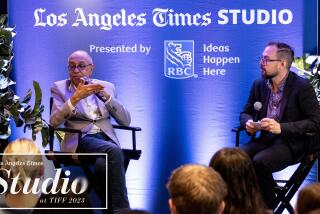Struggle and Obscurity Before His Finest Hour
- Share via
One of last century’s ironies is that Winston Churchill’s heroism would not have been possible without Adolf Hitler’s villainy.
They rode opposite ends of a teeter-totter. History would not have summoned Churchill to greatness had there been no Third Reich to resist as Hitler’s forces occupied much of Europe and menaced Britain.
That makes HBO’s “The Gathering Storm”--drawn largely from the volume of Churchill’s memoirs spanning the period between World Wars I and II--all the more fascinating, and it gives Albert Finney one of his meatier roles as the British leader (earlier played by actors ranging from Robert Hardy to Richard Burton) who led his nation through a devastating war after emerging from his own personal and political wilderness when already deep into his 60s.
Vanessa Redgrave ably supports Finney as Churchill’s wife, Clementine. It’s worth noting, too, the other standout British actors appear here in relatively minor roles, including Oscar-winning Jim Broadbent (“Iris”) as Churchill’s political ally, Desmond Morton; Oscar-nominated Tom Wilkinson (“In the Bedroom”) as Sir Robert Vansittart, another ally; Derek Jacobi as Prime Minister Stanley Baldwin; Celia Imrie as Churchill’s secretary, Violet Pearman; and John Standing as Lord Moyne, who is barely a footnote. Either roles are sparse or these actors welcome association with quality in any capacity.
Churchill was one of those historical figures for all seasons. He was a talented writer, an able artist and, like many successful politicians, a kick-butt performer. His unlikely comeback from the brink of obscurity was remarkable, as was his speechwriting and speechmaking. He is possibly as renowned today for his oft-quoted eloquence under fire as for his courage and vision as a war leader, most notably in those grim early days when the British buckled but didn’t falter while standing virtually alone against Germany. His speeches contain passages that still deliver lumps in the throat across decades, as when he urged on his people against the Nazi threat in 1940 with these famous words:
“Let us therefore brace ourselves to our duties, and so bear ourselves that, if the British Empire and Commonwealth last for a thousand years, men will still say: ‘This was their finest hour.’”
It’s 1934, at his darkest hour, when we meet Churchill here, five years after he had lost his cabinet post as Chancellor of the Exchequer when the Tories were swept from power by the Labor Party. His pedigree includes a slew of ministerial posts since 1908, and he remains a Member of Parliament.
But he is now a fraying, out-of-favor, almost decadent aging statesman. “Look at me,” he protests. “No power. No prospective power.” Then he adds, almost admiringly about the fame and influence of the criminal whose destiny will alter his own: “Look at Hitler.”
His finances in arrears, his life burning down along with his famous cigars, his spellbinding oratory and once-thriving government career apparently behind him, he paints, gardens, putters and grumbles around his Chartwell country estate in what a political foe calls “the evening of his days.”
Hardly, as it turns out, for Hugh Whitemore’s teleplay concludes with Churchill again being named First Lord of the Admiralty in 1939. The storm first gathers, then blows Churchill right to 10 Downing Street, his warnings about the Nazis and his pleas for the nation to rearm ultimately sinking in after Germany attacks Poland. In 1940, he succeeded Neville Chamberlain as prime minister.
He was not all-wise. As young First Lord of the Admiralty early in World War I, for example, he hatched a plan for a naval attack on Constantinople that failed badly, and then approved a disastrous invasion of Gallipoli, for which his critics continued to fault him years later.
Nor is Churchill’s thinking always unflawed in this story directed adroitly by Richard Loncraine and staged lushly in London and at Chartwell. If right about Germany, he is wrong about India, playing the blowhard when harrumphing about Britain possibly losing colonial control to a “gang of seditious Hindus” led by Mohandas K. Gandhi “striding half-naked up the steps ... to parley on equal terms with representatives of the ... king.”
Finney’s Churchill is persuasively arrogant, stubborn, hot-tempered and robust, passionately debating Baldwin and arguing in Parliament against pacifying Hitler. He builds his case from confidential information fed privately to him by Ralph Wigram (Linus Roache) and others in the Foreign Office who oppose the government’s appeasement policies.
He is also despairing, however, a spirit muted by frequent melancholia that he and Clementine call his “black dog.” Based on this account and others, she must have found living with him intolerable at times, and at one point here angrily hits him with a plate of sprouts.
Family conflicts are sometimes punctuated by his impish humor, too, as in Winston knifing through a ferocious argument at home with this mock admonition: “Don’t interrupt me while I’m interrupting!”
As clouds darken, these Chartwell skirmishes are innocent foreplay for the great battle that will make Churchill an epic figure of history.
“The Gathering Storm” premieres tonight at 8 on HBO. The network has rated it TV-PG-DV (may be unsuitable for young children, with advisories for suggestive dialogue and violence).

